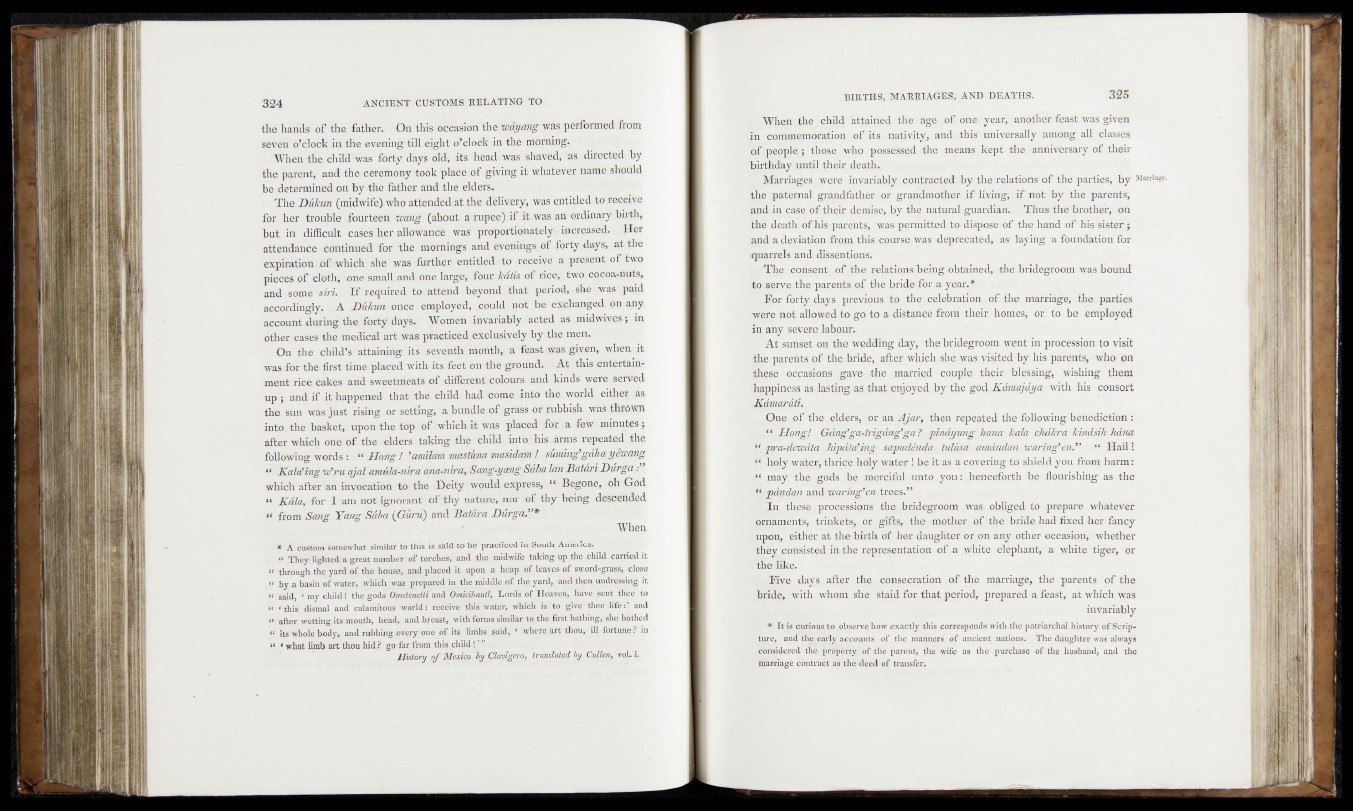
the hands of the ^father;'. f Orithis-joficasion '£k\aMdydng was performed -.from
seven o’clock ihffife^venmg; till «gghtmAelacki ia; the morning, i
- ‘ Wheriithe, chilfiTwas foi%OKps old}ri£vhh&d^was shaved, 'as directed by
the parent, andj.tbeuesremoriyltoo'k place jof ,givingJt whatetv&^amc should
be determined.on byvtlie father and the elders.) .
The D.ukun (midwife)-Who attended>at.the „delivery, was entitled jtd ajec&ve
for her trouble, .fourteen wang*. (about aa;upee) ii^itfjwaslatto^dinary)bhth,
'but in difficult cases ‘her allowance was'proportionately; increased - 'F'er
attendancecconrialuctb fofej’the,,-mornings and eveningsjof forty*daysJf at,the
expiration^which, she was-further- enticed, to reeei^eja-preson't^of^two
piedesrbf, cloth,. one^smal! and.one-large', four kalis, of rice^ t'^OjC0go%£ipts,
and- some I f required to^itttend;beyond :that .period, ^she'+was paid
accordingly. A Ditku?n> once employed, c„ouM ^rjotulhe exchanged ,on;any
account .during the forty days-c Women , invariably, aacted asi, midwives ; in
other cases the medical art „was-practiced .exclusively by-the men.
.On ite. child’s attaining, i k 1 seventh month,. a; fijari,y«as given, -\yken-it
was for the first lime, placed with its feet ojutlie/grpund. -;r At this entertainment
riceiCakes and sweetmeats ,©f different colours .and; kirid’s^wnre seryed
up j and if it happened that; therchild.-had.lcome into the.,world, .either as
the sun was just;risifig .or getting; ,a bundle-of grass or rubbish was thrown
into the basket, upon the top. o f »which it was placed^fqr a few miniates.5
after which orTe.of the elders, taking thp child fntb„riiis arms frepcated the
following words : “ Hang!. ’amilam mastima masidom■}_
“ Kala’ing w’ru ajal amula-nira ana-mira* Sapg-yqVg-fiMw Batari D urgftj^
which after?aninvocation to the Deity wpuld'e^rpss,- « -Begone,^phjOpd
U Kala, cfor I am not ignorant of thy natarerps’.-.o^t^K^hg' descended
*f from Sang Yang Saha (Guni) and Bat&ra JOdrga”*
- When
* A custom somewhat similar to this is said to be practiced inSouth, America. ,
- V 351^55lighted a great number, of torches,' and, the midwife taking, up the child carded.it
<* through the yard of the house, and placed it,upon a heap Of leaves of sword-grass,^!^©
[i‘ by a basin of water, .which was prepared in the gaiddle^of the yard, and then undressing it
« said, ‘ ihy chfld'r the gods ^Smeteuctti and OniidMutl, Lord’s o'fHdavefi, hgve sent thee fc
• flcU AU. and calamitous-world f .receivethis-water, "which is to give 'wide life s’1-and
:tt after wetting its mouth; head, .and. breast, '.with forms similar to. the first bathing,.^ bathed
« fts whole body, and rubbing every,one pf its limbs said, ‘ where art thou, ill fortune? in
« «what limb art thou hid? go fer from this .chUd {’ ”
History pf_ Mexico t y Clcvoigero, translated by Cyllen, vol. i
, When thepchflch attuned 4th§..|-ag§ &>£i ope' year, .another feast was given
In •nsa^yaatjlc«tion>, of. hsjynativity. and „thjls universally among all classes
qf m&bt^'thpse^i^Jlp^p^e^^djJlhp..means kept the anniversary o f their
birthday pntihfheir,: ^
' .^Marriages |W6re- invariably.,contracted.’h)Sfiih.^elations of the parties, by Marriage.
to© paternalvmandfather^o^ grapdrn^tjjeft- if livingsvif not by the parents,
and incase ofnfeheir .demise,„by (the n§,tpral guardian/ Thus;the brother, on
-.the death of his parents, .was permitted, to disposes of the hand of his sister j
■and, a.deyiation from,thi^upurse; was ^epreCsi.tejdi^a^i^ying. a foundation for
Quarrels and j^issenponss; "Tf
The consent o f 'the relationsib^jng,obtained, dthe bridegroom was bound
to ®|ryesthn.jparents o f ,the liride for a year.* „■
„VFor .forty-days,,previous, to4;.ths.,Gelebratio^i.Aof the., marriage^ the parties
-weye not allowed jtoi go--to- a distance fieom. their homes, ’hr', to be employed
in .any[se,yej?,e labour. ’ ^ .
jjjf. At sunset on the wedding day, dhe bridegroom went in procession to visit
the parentsmf'the bride,. afteXi^hich.^he was visited, by' his parents, who on
rfthese uccaSipns gaveuthg -married couple , thejgy blessing,. -..wishing them
jhappinpss as lasting as thajb enjoyed by the. god ,Kdmajdya with his consort
*M0 iardti. , .
• vOne, ..oJr tte. ..elders« or an Jkjar,\ then,-repeated the following benediction :
HongJ Gdng’ga-trigdng’ga ? pindyung hana kala chdkra kindsih hdna
Ip^pga-d&Wata thipdta’ing sapudenda tidusa ctnsdndani’waring’e n “ Hail S
I p ,hcly 'Wa^er,. thffce holy, water !, be it as a cpyeringlo; shield you from harm:
nSJ. may- the_gods »Be „".merciful untp -you; henceforth he; flourishing as the
n.pdndan and waring’en-ttpes.” ,
In Ahtese, prooessipn^ ,thie bridegroom was obligedato prepare whatever
'mr-namehts, trinkets, or gifts, thpj. mother o f the bride had fixed her fancy
upon, either at the birth of her daughter or on any other occasion, whether
they consjsted xn the representation o f a .white’ elephant, a white tiger, or
the like.
Eive days after the consecration 'of the marriage, the parents o f the
bride, with-.whom. she. staid for that period, prepared a feast, at which was
invariably
* It is curious to observe how exactly this corresponds, with the patriarchal history of Scrip- '
tore, and the early accounts of the manners .of. ancient nations. The daughter was always
considered the property of the parent, the wife as the purchase of the husband, and the
feavriage contract as the deed of transfer.